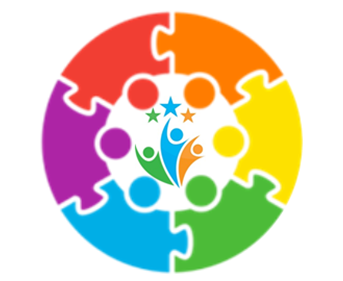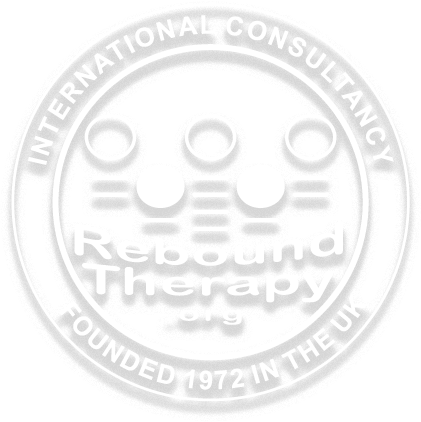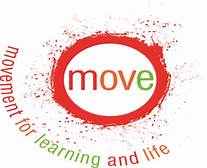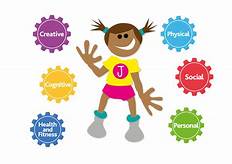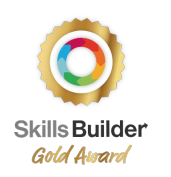Post-16
Upper & Lower Evergreens Nancealverne Sixth Form

Please visit our Careers and Work related Learning page for more information.
Intent
At Nancealverne Sixth Form the development of the curriculum for young people is different from the experiences they will have had in the lower Key Stages of the school with a particular focus on areas of Preparation for Adulthood:
“With high aspirations, and the right support, the vast majority of children and young people can go on to achieve successful long-term outcomes in adult life. Local authorities, education providers and their partners should work together to help children and young people to realise their ambitions”
(HM Government, 2015)
This is very purposeful, as we recognise that making decision and choices about their future adult life is a key element of the education for young people.
The Sixth Form provision is divided into lower and an upper sixth form group base and provides support for young people from year 10 to year 14.
All those in the sixth form will be offered a tailored programme of skills development that focuses on their further educational aspirations and work experience opportunities, whilst addressing their social and emotional needs at a significant time of change when they may be finding it extremely difficult to conceptualise or plan for the future.
With this in mind, the key elements of the curriculum can be outlined as;
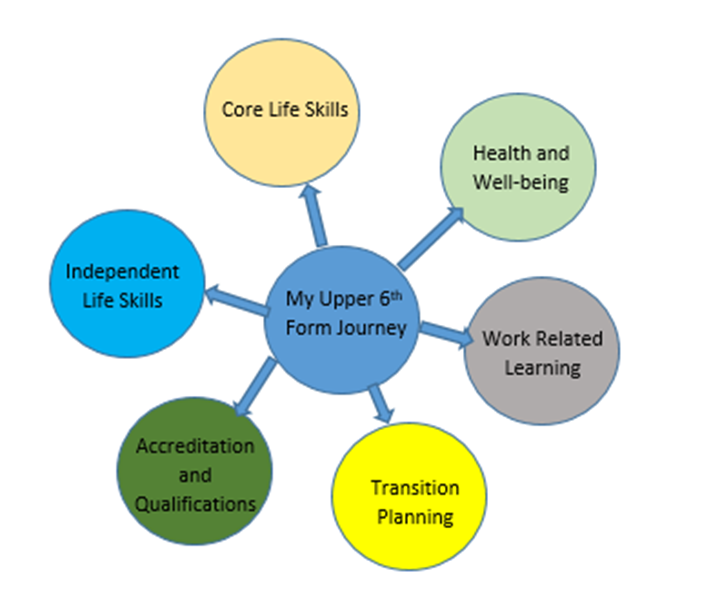
Within each of the curriculum areas, the key learning and programmes of study are outlined below.
These are designed to be an overview of all the areas which young people will experience during their time in lower and upper sixth form. More detailed planning for areas will focus on key skills to practice in context, and those to develop further.
Implementation
|
Core life skills including functional English and Maths |
|
|
Health and well-being |
|
|
Work-related Learning |
|
|
Independence skills |
|
|
Accreditation and qualification |
|
|
Transition Planning |
|
Nancealverne recognises that not all young people will follow the same journey throughout their time in the school. This is also very relevant for those young people entering the sixth form provision – and as such, a pathways approach to learning is in place to help identify the right journey into adulthood for all young people.
There are three core pathways in place for young people to follow. Everyone has access to the curriculum areas outlined above, but the detail for these young people is very different – making sure thy leave school with the right skills they need to move into their adult life successfully.
However, we also recognise the needs of those young people with high-multi-sensory needs that may be based in other class setting within the school and who join sixth form for focused activities and inclusion opportunities. As such, a therapeutic pathway has been developed for those young people which take into account their key development aims and priorities as they move into adulthood.
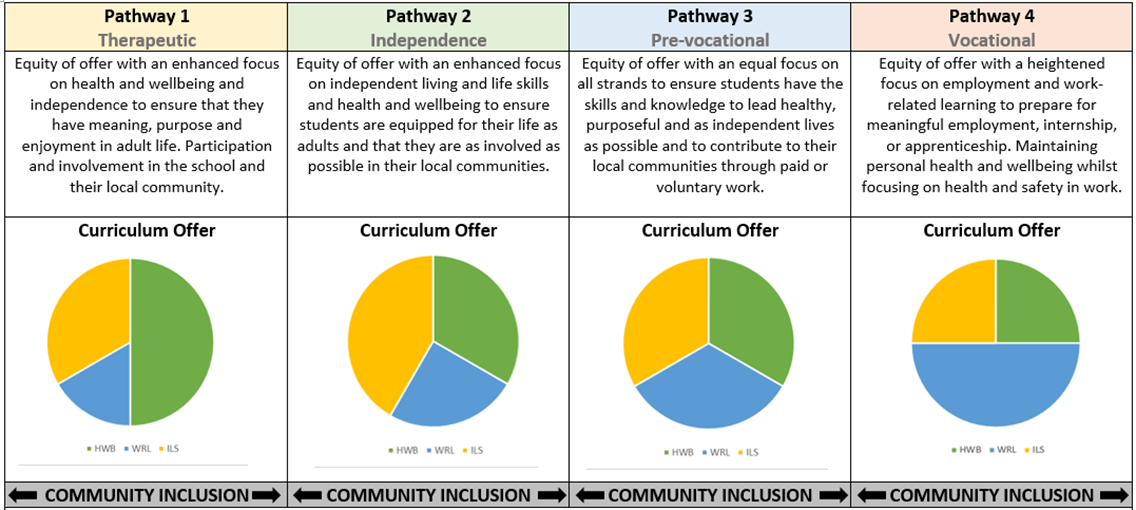
Through each pathway option, accreditation and qualification routes can be followed through the awarding bodies (students can move between pathways – looked at on an individual basis).

Impact
At Nancealverne School, our post-16 provision is dedicated to nurturing the potential of each student, ensuring they achieve excellence in both their personal and academic journeys. Our commitment to embedding the Skills Builder framework, ASDAN programs, and a range of qualifications creates a robust foundation for lifelong learning and success shown by our 100% in successful transitions to further education, alternative provisions and meaningful and fulfilling pathways. Our comprehensive approach ensures students develop core life skills and independent living skills crucial for their future. Through tailored transition planning and work-related learning opportunities, we empower students to make informed decisions about their futures, seamlessly integrating into society with confidence and competence. Recognising the importance of holistic development, we prioritise the health and well-being of our students with many of our students complete some form of physical activity to stay health outside of school after we have introduced it to them. Our programs include structured physical education, mental health support, and initiatives that promote a balanced lifestyle, ensuring students are well-prepared to manage their physical and emotional health independently.
Impact against the Gatsby Benchmarks Compliance
Our adherence to the Gatsby Benchmarks ensures our careers education, information, advice, and guidance (CEIAG) meet national standards. By providing encounters with employers, experiences of workplaces, and access to information about career paths, we help students understand and navigate the world of work effectively. This provides a space for all students to explore the world of work and set meaningful goals.
Aligned with Ofsted’s outstanding criteria, our provision has an impact through:
High Expectations and Aspirations: We set ambitious goals for all students, fostering a culture of high expectations and continuous improvement allowing the students to take ownership over their own goals and future outcomes.
Quality of Education: Our curriculum is rich, varied, and tailored to meet individual needs, ensuring students acquire deep knowledge, understanding, and skills. We employ evidence-based teaching methods that engage and challenge all learners.
Personalised Support: Through detailed assessment and individualised support plans, we address the unique needs of each student, ensuring they make excellent progress from their starting points. This allows the staff to support the students through each step, celebrating successes and achievements.
Positive Behaviour and Attitudes: We cultivate a positive learning environment where students feel safe, valued, and motivated to achieve their best. Learning spaces are meaningful and align with what is being taught.
Leadership and Management: The post-16 leadership team demonstrates a relentless focus on improving educational outcomes for all of its students, with robust systems in place for monitoring, evaluation, and continuous development, this allows us to have a positive impact on the students’ long-term outcomes.
In conclusion, Nancealverne School's post-16 provision stands out as a beacon of excellence, preparing students not only for academic success but also for fulfilling, independent lives. Our holistic, student-centered approach ensures every student can thrive, equipped with the skills, knowledge, and confidence to pursue their aspirations which is shown through our data systems.
Cornwall Council Guidance Documents
At Nancealverne Sixth Form, the development of the curriculum for young people is different from the experiences they will have had in the lower Key Stages of the school. This is very purposeful, as we recognise that making decisions and choices about their future adult life is a key element of the education for young people.
The Sixth Form provision is divided into a Lower and an Upper Sixth Form group base ('The Evergreens'), and provides support for young people from Year 10 - Year 14 in these groupings.
All those in the Sixth Form are offered a tailored programme of skills development that focuses on further educational aspirations and work experience opportunities, whilst supporting social and emotional needs.
Upper Sixth Pathways
Nancealverne recognises that not all young people will follow the same journey throughout their time in the school. This is also very relevant for those young people entering the Sixth Form provision – and as such, a pathways approach to learning is in place to help identify the right journey into adulthood.
There are four pathways in place for young people to follow. Everyone has access to these pathways, but every pupil will follow their own bespoke package, making sure they leave the school with the right skills they need to move into their adult life successfully.
However, we also recognise the needs young people with high Multi-Sensory needs that may be based in other class settings with the school (such as those in the L2L class base) and who may join the Sixth Form for focused activities and inclusion opportunities. As such, these pathways have been developed to take into account their key development aims and priorities as they move into adulthood.
- Pathway 1 - Therapeutic
- Pathway 2 - Independence
- Pathway 3 - Pre-Vocational
- Pathway 4 - Vocational

Lower Sixth Pathways
The pathways approach to learning is also followed in the Lower Sixth Form provision from the end of Key Stage 4 onward.
Students within the Lower Sixth Form achieve accredited learning – as opposed to qualifications, which are introduced in the Upper Sixth Form.
Students learning at pathway 1 will develop key functional skills in Maths and English by studying differentiated ASDAN courses delivered at entry 1.
Learners will also follow ASDAN courses: Personal Progress and Personal and Social Development to gain experiences in a range of foundation subjects. This means that we are able to offer a nationally recognised accreditation in wider curriculum areas and key life skills opportunities.
Students learning at Pathway 3 and 4 develop their skills linked to the preparation for adulthood areas within the EHCP as well as identified next steps. These are embedded within the whole learning experience, ensuring that these students are prepared for their next stage.
Nationally recognised certification in English and Maths is also offered, through Pearsons Functional Skills: English and Maths.
All students will also access opportunities linked to work-related learning, including individual work experience.

